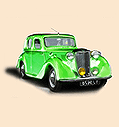|
End of Menu Items |
YT 3477 - rebuilding 
Hello all MG Y type enthusiasts
As promised (and better late than never) some information and images regarding YT 3477, which currently resides, as it has since 1968, near Grafton Australia. This is on the north coast of NSW, a rural city of about 17,000 folk.
I acquired the car on January the first, 2001, from Harry and Doris, a couple who bought it in 1951, at which time it was already laid up with cylinder head woes.
Harry tells me that, at that time, the car was the property of a Ceylonese or Indian doctor, possibly a personal import, and already finished in black with a red interior and a blackish salt and pepper hood. Material remnants still are present to confirm this hood material type and colour. Doris, Harry's wife, drove the car both for pleasure and as family transport from 1951 till 1967, when they moved to a job near Grafton, and in 1968 the car was dismantled for an engine rebuild. Fate intervened, and Harry was not able to complete the task and so the car sat in a partly closed shed till 1993, when he asked me to inspect and comment about the feasibility of restoring the vehicle.
As soon as I saw the car I was concerned about stabilising the deterioration process, lifted it off the dirt floor and fish oiled the vehicle inside and out. Some parts were stored in a better environment, however the rats and moist air both took a heavy toll on the trim work and on the hood fabric.
Harry, an engineer, had cared for the engine parts, and vitally had kept every part removed in tins and jars. Other than a few bolts, screws etc. the only part actually missing is the base of the rear seat. It is thought that a visitor took it to a nearby riverbank as a cushion, and it was never returned.
Minor dents and surface rust were the main concern as far as the body was concerned, but much more came to light during the dismantling process ...
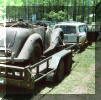 YT 3477 on the trailer |
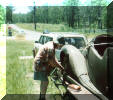 Lashed down for the journey |
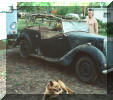 Before ... |
 The finished chassis |
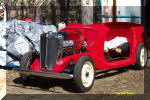 The body goes on ... |
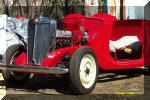 Close up of the engine |
As the unrestored photos show, the car looked basically complete, and quite sound with only minimal body damage. Unfortunately, the 30 odd years of damp had taken their toll on the structural box sections under both door openings, and upon removal of the running boards I was presented with quite a challenge, the replacement of sills and reinforcements on both sides. Also needing replacement were, boot floor, most of the tool box area, rear seat pans, and numerous patches along the rear mudguard attachment lines on both sides.
The body was removed from the chassis, and mounted on a purpose built steel box section trolley using all the original mounts. In hindsight, I would advise welding or bolting a brace between the door pillars, both along and across the car, as well as diagonally from dash mounting plates to door hinge mount on B pillar. This will keep the tub square and the door openings at factory dimensions.
The trolley puts the tub about 18 inches higher than normal, and this is a great height to work at, as well as affording good access under the body for floor area repairs.
John Boyle Smash Repairs, in my home town arranged for the blast removal of the old paint and rust, using Ilmanite, a fine grit medium.
The body was immediately etch primed, and with the body on trolley at John's workshop, I began the repair process with his expert guidance. As I could only work there as his other work schedule allowed, I was able to also work at home on the chassis and drive train.
The chassis was brushed, scraped and sandblasted to bare metal, and the build-up commenced. All brake components were re-sleeved in stainless, and fitted with local overhaul kits. Hoses were remanufactured in a nearby town, and the same supplier relined the shoes and machined the drums. All suspension rubbers and bushes were locally sourced components.
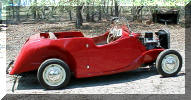 Right hand side view |
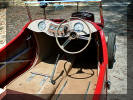 The dash |
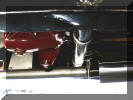 Gearbox and exhaust pipe |
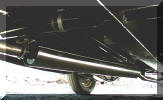 Exhaust pipe |
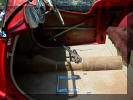 Inside |
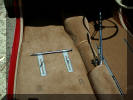 Passenger floor |
The body fitting process went smoothly, at the panel shop, with the assistance of a couple of hanger-ons, and the car went home for interior fit out and awaiting the mudguards (fenders) bonnet etc.
I already had the trimmer/upholsterer guy, Peter Gebhardt, working hard doing the seats and interior panels.
I made a press, similar to a tennis racquet press, to form the depressions in the foot well panels to clear around the accelerator pedal, and used Hidem binding sourced from Woolies for authentic appearance. All of the vertical trim panels in the car are made from 3.2mm marine grade ply wood, ensuring a weather resistant base for the upholstery.
The car is trimmed in beige, with red Hidem, as per the 1948 show model advertised in Motor Magazine in November '48, a brochure of which is presented in the reprints section of the Y website. I know David Lawrence questions the veracity of reports of vehicles in this trim, however I have owned open cars with dark seats and will never own another due to our hot prevailing climatic conditions. The same logic guided the choice of roofing fabric, it is trimmed in a light tan (close in colour to the tan fabric often present on T and Y tourer cars) marine grade tonneau vinyl as the heat and dust from dirt roads destro fabric roofs quickly in my district.
I had a local exhaust maker recreate the original style muffler and pipe-work in a combination of two grades of stainless steel (one accepts bending better but does not polish as brightly), the system is a work of art and should outlast me!
Wiring was straight forward, I teach this skill to apprentice Auto Electricians, and all instruments were replaced as found in the original dashboard, untouched, guaranteed, since 1951. Again this is at odds with the conclusions presented by David Lawrence, however there are sufficient other authentic anomalies on this vehicle to justify retaining the as found layout rather than modifying to suit the contents of David's superb reference work.
I presented the car for inspection for road registration on the22nd of December, 2002, less than 2 years from acquiring it, and received the number plate YMG 122. I have since fitted personal series plates, they cost $186 Australian here - YMG 49T.
The car is great fun to drive, won a trophy at its first rally, and cruises nicely at 50 mph. Good fuel economy - 27 mpg (imp).
Harry and Dolly were both delighted with the restoration results, sadly they have both passed away in the last four months.
Obviously, there were many hurdles to overcome in the restoration process, and I cannot commend enough the assistance given by people accessing the Y bulletin board, nearly every hiccup was addressed promptly and accurately by some kind enthusiast/s somewhere. If there is interest, I will attempt to describe some of the problems encountered and my solutions, in a later text.
If anyone would like further photo details, please enquire and I will assist where I am able.
 Front |
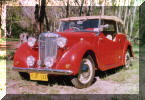 Left side |
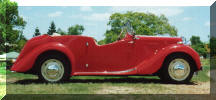 Right side |
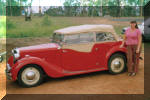 Topped |
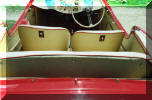 Interior | |
Happy motoring
Geoff Meller and YT347
